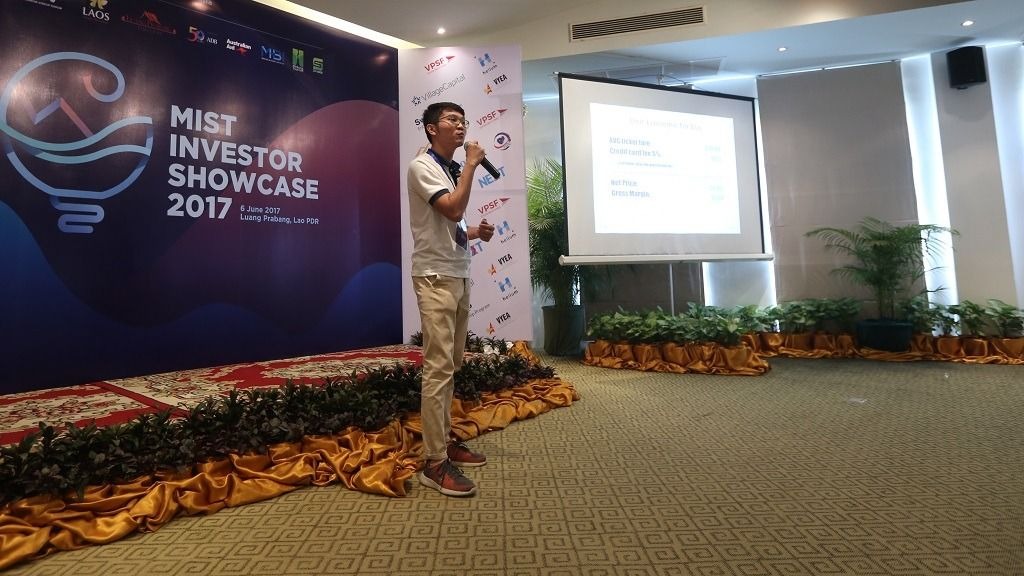
Opening Opportunities for Local Startups in the Mekong Region
The Mekong Business Initiative, sponsored by the Australian Government and the Asian Development Bank, is sourcing international investment and facilitating regional expansion for innovative startups.
Information Technology graduate Langda Chea spent years working for international companies, but it did little to satisfy his passion for entrepreneurship. He always dreamed of running his own business.
The idea for Langda’s startup came from his regular business trips to Battambang from Phnom Penh, Cambodia's two largest cities.
“I found it really difficult as a traveler to actually buy a bus ticket,” he recalls. “You need to call the company to find bus times, often you are transferred from one bus to the next, and there are a lot of scams. It is a waste of time and there was poor customer service. I felt there was a better way to do this.”
His initial solution was to create a regularly updated website that catalogued the different bus companies and private taxi operators, listed all the routes, and publicized the bus schedules. A background in IT and a good command of English made it easy enough for Langda to put all the information together, but he soon realized that this resource only tackled part of the problem. Users still needed to book bus tickets.
A gap in the market
Langda started questioning why there wasn’t an adequate booking platform in Cambodia. It was clear that there was a gap in the market, and he became determined to fill it. “I settled on a name, repurposed the website, and things took off from there,” he says.
BookMeBus began in 2013 with only a few domestic routes, but has since grown to connect Cambodia with other countries in the Greater Mekong Subregion: Lao People’s Democratic Republic (Lao PDR), Thailand, and Viet Nam.
The first five years however were not easy. Disrupting a market never is, especially one that has had limited exposure to technology.
Most bus and private taxi companies in Cambodia are small, family-run businesses. They record their information on paper and take bookings by telephone. Newer companies were more open to using software, but the larger, more established companies rejected it.
BookMeBus needed to show proof of concept to convince the bus companies to use its centralized booking system. Langda began looking for investors so that he could start scaling his startup.
Connecting startups with investors
BookMeBus secured financial backing from a syndicate of delegates that were touring Cambodia in 2016.
The tour was organized by the Mekong Angel Investor Network (MAIN), which is supported by the Mekong Business Initiative (MBI). MAIN brings international delegations to the Mekong region to engage with local entrepreneurs. Delegates spend up to two weeks on regional tours, and the startup ecosystems benefit from training, engagement, encouragement, knowledge transfer, and investment.
"I found it unthinkable that there is still a country where you couldn’t book bus tickets online and so I thought this was an extraordinary opportunity,” says Petra Kolesarova, one of the delegates. “I had a really good feeling from Langda and he seemed like someone who was willing to work hard, progress, and help the startup community in Cambodia to grow.”
The investment enabled Langda to propel his business forward. “With the funds we got from Petra and the other delegates through MBI assistance, we were able to improve marketing, increase sales, and use this to show and convince the bus companies to cooperate with us,” Langda says.
BookMeBus now works with over 40 bus companies and half of them use the software. The number of software users continues to increase, as the startup’s success demonstrates the benefits of a centralized booking platform.
Expanding to other countries
In 2017, Langda applied to join the Market Access Program of Mekong Innovative Startups in Tourism (MIST), a competition for mature startups with ambitions to expand into new markets. The innovation program is a collaboration between MBI and the Mekong Tourism Coordinating Office.
“Myanmar is a big market, and I saw potential. The technology was there and I was ready to scale,” Langda relates.
Langda was accepted in the program , and the market access tour to Myanmar will take place in January 2018.
“BookMeBus will face a few new challenges in Myanmar,” says Jason Lusk, focal person for MIST. “One is competition; they are not the only company looking at the market. Everyone is going to wrestle with the same challenges of trying to coordinate bus operators that are mostly close, family-run businesses. But this is where MIST can help. We have local resources to facilitate meetings and get the dialogue going.”
After the market access tour, BookMeBus will develop an action plan to launch its platform in Myanmar. MIST will continue offering support throughout the expansion process and beyond.
“MIST isn’t intended to be a one-time experience,” says Jason. “It is meant to provide ongoing support and to plug entrepreneurs like Langda Chea into a network. Ultimately, we are here to help companies like BookMeBus scale. Our hope is to assist at every stage of that journey.”
The tourism impact of BookMeBus is clear. Travelers can move through Cambodia with greater ease, and can enjoy better access to secondary destinations and cross-border areas. Startups like BookMeBus promote inclusive tourism because they make other destinations more accessible. They can also boost visitor return rates, which significantly impact on the tourism industries of Cambodia, Lao PDR, Myanmar, and Viet Nam.
About the Mekong Business Initiative (MBI)
The Asian Development Bank and the Australian Government jointly launched the MBI in 2015. The MBI catalyzes private sector development in emerging ASEAN markets, focusing on Cambodia, Lao PDR, Myanmar, and Viet Nam. The program aims to improve the business-enabling environment in these markets with particular focus on business advocacy, alternative finance, and innovation.
Follow MekongBusinessInitiative on Facebook.
